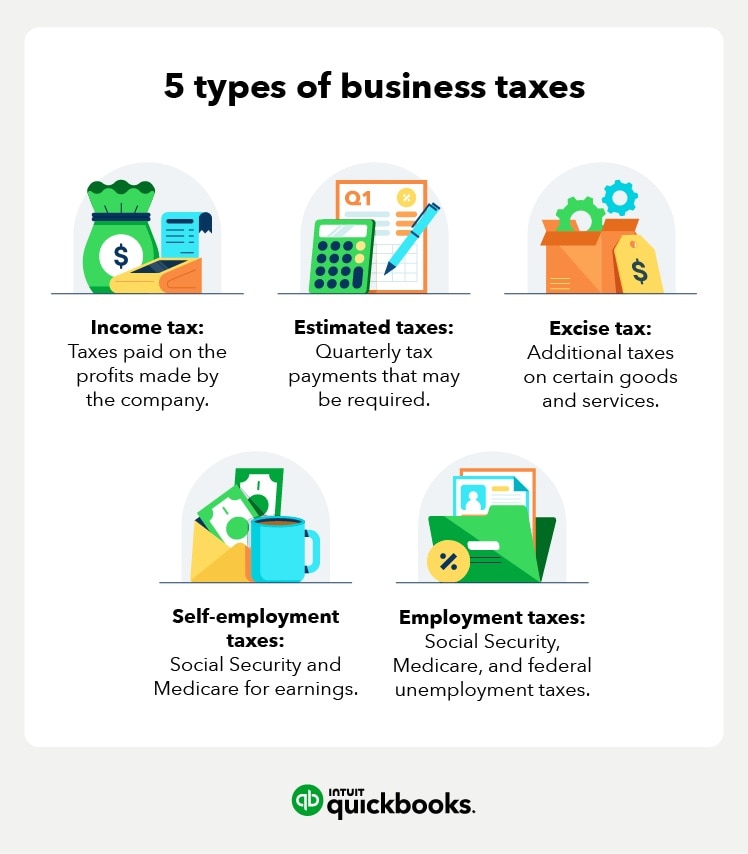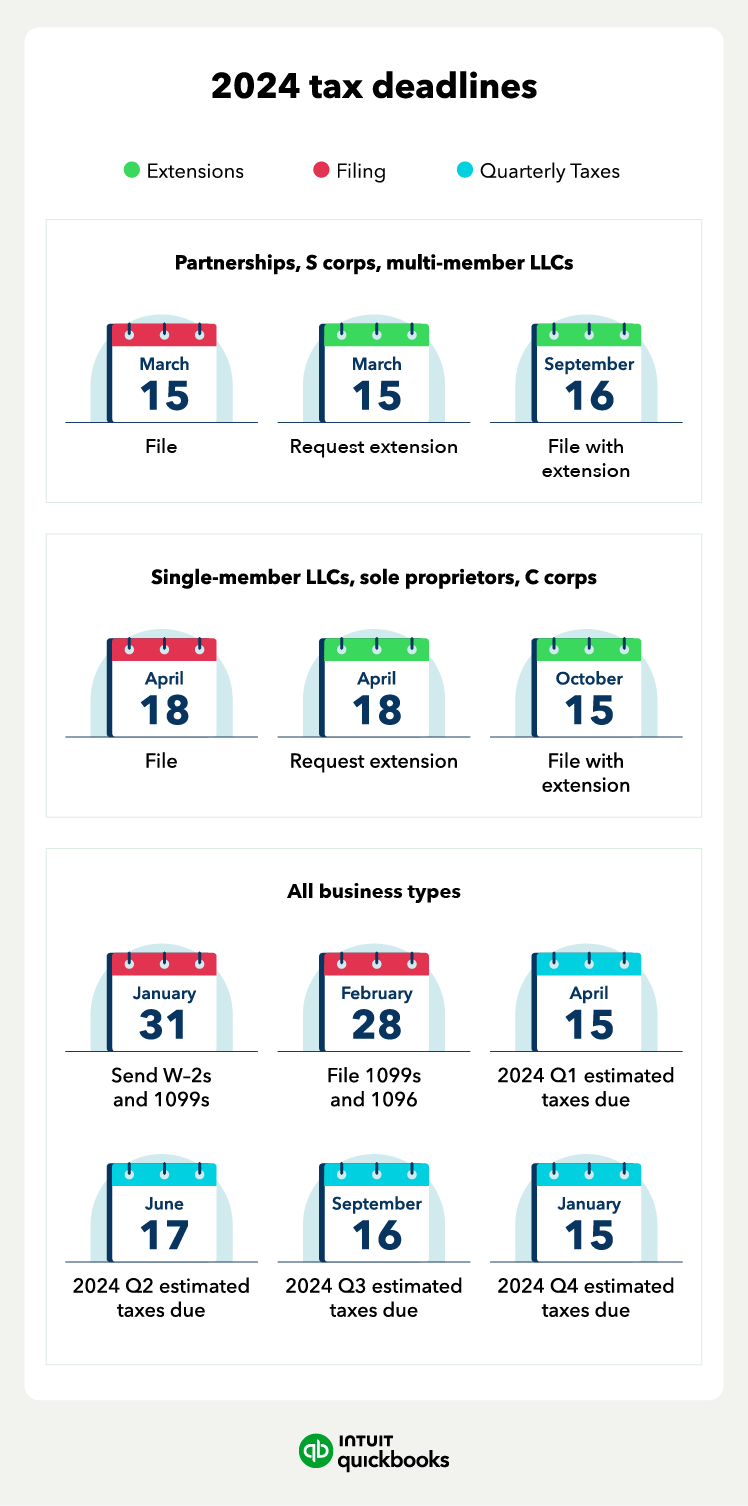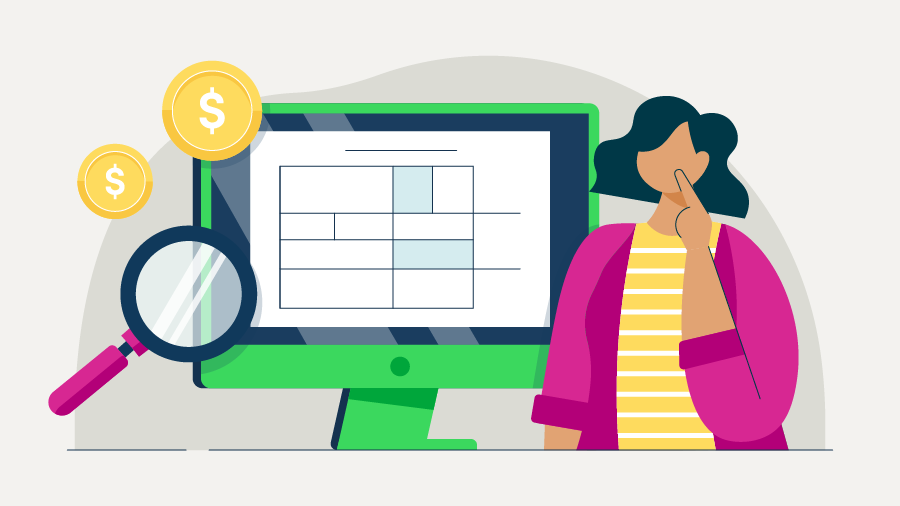

As a small business owner, you’ve got plenty on your plate. From hiring the right employees to overseeing the daily operations of your company, it can be challenging to find the time to manage your books.
However, staying prepared year-round can help make filing easier when tax season comes around. We’ve compiled the essential steps you need to follow to streamline your small business tax prep and filing process.
This small business tax preparation checklist breaks down the six basics of filing small business taxes and includes a downloadable checklist to stay on top of your small business tax prep needs—including what tax forms to file and documentation to gather.

All businesses have to pay certain taxes to the IRS and state tax authorities. As a small business owner, it’s your responsibility to ensure that you meet your federal and state tax obligations. Whether you run a sole proprietorship , partnership , S corporation, or C corporation, these are the five main types of taxes your business may be responsible for.
Income taxes are based on the money your business makes and are paid on both a federal and state level. The amount you owe depends on how your business is set up.
C Corporations deal with double taxation, meaning they pay taxes twice—first on the money the business makes and then again when they pay dividends to their owners (shareholders). The current federal tax rate for C corporations is 21%.
Unlike C Corporations, businesses like sole proprietorships, partnerships, and S corporations pay income taxes individually. These entities are known as “flow-through” entities (also known as pass-through entities ) because the income is first reported at the entity level and then “flows-through” to the individual’s tax return on Schedule K-1.
Also unlike C Corporations, no federal taxes are paid at the business level for these types. The amount of income tax you pay depends on your personal tax bracket.
A business’ state income tax varies by state—and sometimes by city. Depending on where you do business and make money, you may have filing requirements in different jurisdictions. The rules and requirements are complex, and it’s best to consult your tax advisor if those rules apply to you.
Businesses are required to pay estimated taxes quarterly. If you run a C Corporation and you think you'll owe more than $500 in taxes, you have to pay estimated taxes every quarter. For all other business structures, you need to pay estimated taxes, too, but only if you expect to owe more than $500 on your personal tax return.
The estimated tax deadlines for 2024 are as follows:
If the date for paying taxes falls on a holiday or weekend, taxes will be due the following business day.
If you're a sole proprietor or a partner actively involved in your business, you need to pay both the employee and employer parts of Social Security and Medicare taxes. The current self-employment tax rate in 2024 is 15.3% and is divided as follows:
If you earn more than $400 from your business, you have to report it as self-employed income and pay the self-employment tax .
When you have employees in your small business, there are certain taxes you need to handle, known as employment or payroll taxes. Here's what's included:
Consult a tax advisor if you’re unclear about any employment taxes you may be responsible for.
Excise taxes are additional taxes you may have to pay on specific goods or services. If your business performs any of the following, you may have to pay excise taxes:
For a full list of which goods and services excise taxes may apply, refer to the excise tax overview page on the IRS website.
There isn’t a one-size-fits-all business tax form . Depending on your business structure, you’ll need specific forms—like Form 1099-MISC or Form 1120—to report profits, losses, deductions, and credits to the IRS. Here are some common IRS forms for reporting small business taxes:
If you have questions about which forms to file or how to fill them out, a dedicated tax professional can help ensure you file correctly and on time.

As a small business owner, it's easy for tax deadlines to slip your mind. However, it’s important to keep track of when tax payments are due and when you need to file taxes. Unfortunately, the IRS doesn’t take tardiness or failure to pay lightly. To keep your business cash flow in good shape, consider creating a tax calendar.
Here are the essential small business tax dates for 2024:
If any of these dates fall on a weekend or holiday, returns and payments are due the following business day.

Save time by seamlessly moving from books to taxes in QuickBooks, then file your return with unlimited expert help and your maximum refund.*
Start hereWhen filing taxes for your small business, the paperwork can be overwhelming. Knowing which forms to fill out and what documents to provide is crucial. Here's an overview of the tax documents you might need to gather before filing:
General:
Business income taxes:
Business-related expenses:
Receipts for expenses are grouped into the following categories:
Employment taxes:
Nonemployee tax form:
Home office deductions:
Whether you’re tackling your business taxes on your own or hiring a professional tax preparer, this small business tax checklist can guide you in the right direction to make filing your small business taxes easier.
Download the checklist below to compile all the essentials.
Tax deductions and credits are excellent opportunities to reduce your small business tax bill. This is because certain expenses—such as health insurance and office expenses—and investments may be deductible from your taxable income, reducing how much you’ll owe after you file your return.
Knowing which tax breaks and credits may apply to your business is an important step in preparing your business taxes.
Some of the notable small business tax deductions you may qualify for include:
There are many different small business tax credits that you may qualify for. Here are some common business tax credits you should be aware of:
Visit the IRS’s Business Tax Credits page for more information on tax credits your small business may be eligible for.
If your tax situation is complicated, or you can't gather all your documents by the regular tax deadline, consider requesting an extension. You can use Form 7004 to get a six-month extension for reporting your business income.
Remember, an extension to file doesn't mean you get more time to pay. You still need to keep up with your estimated tax payments during this period. Falling behind could result in a fine.
As with other taxpayers, the IRS is eager to collect tax payments, so they’re often willing to work with small business owners to find a solution. If paying on time is tough, contact the IRS early to discuss a payment plan. The sooner, the better.
Running a business can be stressful, but filing taxes doesn’t have to be. This small business tax preparation checklist can help save precious time you’d be spending navigating complex state tax, sales tax , and employment issues, so you can put that time back into your business.
With small business tax planning software like QuickBooks, you can find all necessary documentation in one place for a more seamless tax preparation process. Enjoy the peace of mind that proper tax preparation and compliance brings by applying these essential steps in 2024 and beyond.
We can help you with extension filing before tax deadlines to avoid penalties.
Disclaimers
*QuickBooks Live Tax, powered by TurboTax, is an integrated service available with a QuickBooks Online subscription. Additional terms, conditions and limitations apply. Pay when you file.
**QuickBooks Live Bookkeeping Guided Setup is a one-time virtual session with a Live Bookkeeper. Available to new QuickBooks Online Simple Start, Essentials, Plus, or Advanced subscribers who are within their first 30 days of their subscription. The QuickBooks Live Setup service includes instructions on how to set up your chart of accounts, customize invoices, set up reminders, and connect bank accounts and credit cards. QuickBooks Live Setup does not include Payroll setup or services. Your bookkeeper will only guide you through the setup of your QuickBooks Online account, and cannot set it up on your behalf.
Terms and conditions, features, support, pricing, and service options subject to change without notice.
We provide third-party links as a convenience and for informational purposes only. Intuit does not endorse or approve these products and services, or the opinions of these corporations or organizations or individuals. Intuit accepts no responsibility for the accuracy, legality, or content on these sites.
Recommended for you
How to fill out a 1099 form: Step-by-step instructions and tips
October 13, 2023

How to file small business taxes: A 7-step guide
January 11, 2024

2022 complete list of small-business tax deductions
January 22, 2022
We provide third-party links as a convenience and for informational purposes only. Intuit does not endorse or approve these products and services, or the opinions of these corporations or organizations or individuals. Intuit accepts no responsibility for the accuracy, legality, or content on these sites.
**Product information
QuickBooks Live Assisted Bookkeeping: This is a monthly subscription service offering ongoing guidance on how to manage your books that you maintain full ownership and control. When you request a session with a Live Bookkeeper, they can provide guidance on topics including: bookkeeping automation, categorization, financial reports and dashboards, reconciliation, and workflow creation and management. They can also answer specific questions related to your books and your business. Some basic bookkeeping services may not be included and will be determined by your Live Bookkeeper. The Live Bookkeeper will provide help based on the information you provide.
QuickBooks Live Full-Service Bookkeeping: This is a combination service that includes QuickBooks Live Cleanup and QuickBooks Live Monthly Bookkeeping.
1. QuickBooks Online Advanced supports the upload of 1000 transaction lines for invoices at one time. 37% faster based off of internal tests comparing QuickBooks Online regular invoice workflow with QuickBooks Online Advanced multiple invoice workflow.
2. Access to Priority Circle and its benefits are available only to customers located in the 50 United States, including DC, who have an active, paid subscription to QuickBooks Desktop Enterprise or QuickBooks Online Advanced. Eligibility criteria may apply to certain products. When customers no longer have an active, paid subscription, they will not be eligible to receive benefits. Phone and messaging premium support is available 24/7. Support hours exclude occasional downtime due to system and server maintenance, company events, observed U.S. holidays and events beyond our control. Intuit reserves the right to change these hours without notice. Terms, conditions, pricing, service, support options, and support team members are subject to change without notice.
3. For hours of support and how to contact support, click here.
4. With our Tax Penalty Protection: If you receive a tax notice and send it to us within 15-days of the tax notice we will cover the payroll tax penalty, up to $25,000. Additional conditions and restrictions apply. See more information about the guarantee here: https://payroll.intuit.com/disclosure/.
Terms, conditions, pricing, special features, and service and support options subject to change without notice.
QuickBooks Payments: QuickBooks Payments account subject to eligibility criteria, credit, and application approval. Subscription to QuickBooks Online required. Money movement services are provided by Intuit Payments Inc., licensed as a Money Transmitter by the New York State Department of Financial Services. For more information about Intuit Payments' money transmission licenses, please visit https://www.intuit.com/legal/licenses/payment-licenses/.
QuickBooks Money: QuickBooks Money is a standalone Intuit offering that includes QuickBooks Payments and QuickBooks Checking. Intuit accounts are subject to eligibility criteria, credit, and application approval. Banking services provided by and the QuickBooks Visa® Debit Card is issued by Green Dot Bank, Member FDIC, pursuant to license from Visa U.S.A., Inc. Visa is a registered trademark of Visa International Service Association. QuickBooks Money Deposit Account Agreement applies. Banking services and debit card opening are subject to identity verification and approval by Green Dot Bank. Money movement services are provided by Intuit Payments Inc., licensed as a Money Transmitter by the New York State Department of Financial Services.
QuickBooks Commerce Integration: QuickBooks Online and QuickBooks Commerce sold separately. Integration available.
QuickBooks Live Bookkeeping Guided Setup: The QuickBooks Live Bookkeeping Guided Setup is a one-time virtual session with a QuickBooks expert. It’s available to new QuickBooks Online monthly subscribers who are within the first 30 days of their subscription. The QuickBooks Live Bookkeeping Guided Setup service includes: providing the customer with instructions on how to set up chart of accounts; customized invoices and setup reminders; connecting bank accounts and credit cards. The QuickBooks Live Bookkeeping Guided Setup is not available for QuickBooks trial and QuickBooks Self Employed offerings, and does not include desktop migration, Payroll setup or services. Your expert will only guide the process of setting up a QuickBooks Online account. Terms, conditions, pricing, special features, and service and support options subject to change without notice.